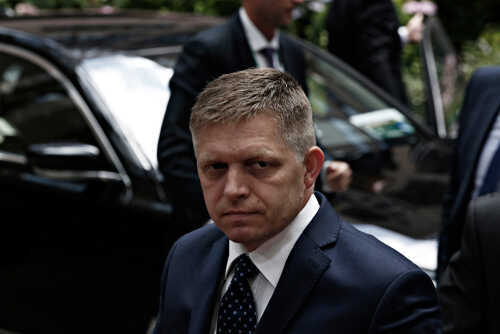(LibertySociety.com) – When a so-called “pacifist” gunman tried to assassinate Slovakia’s Prime Minister because he dared to stand against the NATO-Ukraine bandwagon, the world watched a nation unravel, now, the trial of Juraj Cintula is putting the chaos of modern Europe’s radical polarization on full display for all to see.
At a Glance
- Slovak Prime Minister Robert Fico was shot multiple times in an attempted assassination by Juraj Cintula, a self-professed pro-Ukraine activist.
- The trial exposes Europe’s toxic political climate, with escalating polarization and deep divides over Ukraine, NATO, and national sovereignty.
- Cintula confesses but claims he never meant to kill, blaming his radicalization on Fico’s rhetoric and “cultural grievances.”
- Media, political elites, and the judiciary are all under scrutiny as the trial stirs fierce debate over free speech, extremism, and democratic stability.
A Nation at the Breaking Point: Fico’s Shooting and the Fracture of Slovak Society
Slovakia, a country that used to be a footnote in the annals of European politics, has become a microcosm of everything that’s gone wrong with the West’s descent into radical division. On May 15, 2024, Prime Minister Robert Fico, a man known for his outspoken opposition to NATO’s Ukraine obsession and for daring to put his country’s interests first, was gunned down after a government meeting. His assailant, 72-year-old Juraj Cintula, didn’t fit the Hollywood stereotype of a political radical. He was an aging poet, a former miner, proving once again that the disease of radicalization knows no age limit when the media and political class keep pouring gasoline on the fire.
Fico survived, but the wounds went far deeper than flesh. The attack was instantly seized as a symbol by both sides: Fico’s supporters called out the relentless demonization from media and opposition parties, while his opponents scrambled to distance themselves from the violence yet continued, almost without pause, to paint him and his government as “threats to democracy.” All the while, the average Slovak, like Americans watching their own institutions corrode, saw only a country tearing itself apart, thanks to a toxic cocktail of activist journalism, imported ideological crusades, and a political class more interested in scoring points than protecting citizens.
The Trial: Confessions, Motives, and Media Circus
Juraj Cintula’s trial has become a three-ring circus, with the defendant playing the role of both villain and tragic hero, depending on which network you tune into. Cintula confessed to the shooting, but not to terrorism, he insists he meant only to wound, not to kill, and claims now that it was “cultural grievances” that pushed him over the edge. That’s right, today, even attempted assassins get to claim victimhood status. His social media history is a case study in what happens when endless anti-government propaganda and sanctimonious moralizing poison the well: he posted repeatedly about the need to “act” against Fico, lamenting that other “evil leaders” had survived. The left, naturally, rushes to blame “polarization,” as if they haven’t spent years branding anyone who questions the NATO-Ukraine narrative as a traitor or a fascist.
Throughout the proceedings, expert witnesses painted Cintula as a narcissist, egocentric, impulsive, but not insane. Character witnesses described him as a “rebel,” a man radicalized not by conspiracy theories but by the steady drumbeat of culture-war rhetoric and the sanctification of Ukraine as the new moral frontier. The trial has become less about justice and more about the soul of Slovakia: will it survive as a sovereign nation, or will it keep importing the worst of Western ideological warfare?
Aftermath and Consequences: Europe’s Lessons in Political Violence
The assassination attempt on Fico didn’t just leave one man fighting for his life, it left an entire government in limbo. As Fico recovered, the coalition scrambled to find its footing, exposing just how fragile the machinery of modern democracy has become in the face of relentless ideological warfare. The government’s critics, who spent years howling about “threats to democracy,” now found themselves denouncing violence while refusing to own their role in creating the climate that made it possible.
The judiciary, meanwhile, faces the Herculean task of deciding whether Cintula’s act was terrorism or merely “attempted murder”, a distinction that’s become increasingly blurry in a Europe where political violence is the logical endpoint of endless tribalism. No matter the verdict, the trial’s outcome will set a precedent not just for Slovakia, but for every country grappling with the consequences of media-fueled hysteria and the death of common sense. The attack has already deepened polarization, rattled investor confidence, and left the Slovak public more divided than ever. As the dust settles, one thing is clear: when institutions abandon their duty to foster real debate and instead become echo chambers for imported agendas, it doesn’t take long before someone decides to “take action” outside the bounds of democracy.
Copyright 2025, LibertySociety.com
Click this link for the original source of this article.
Author: Editor
This content is courtesy of, and owned and copyrighted by, https://libertysociety.com and its author. This content is made available by use of the public RSS feed offered by the host site and is used for educational purposes only. If you are the author or represent the host site and would like this content removed now and in the future, please contact USSANews.com using the email address in the Contact page found in the website menu.








